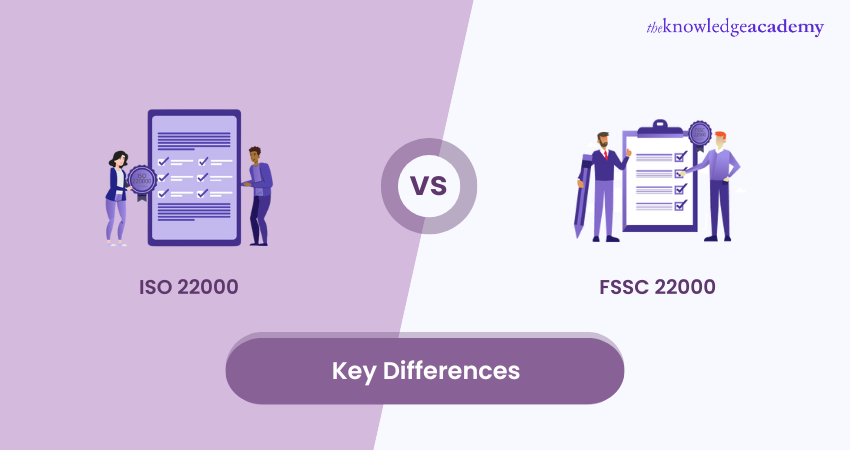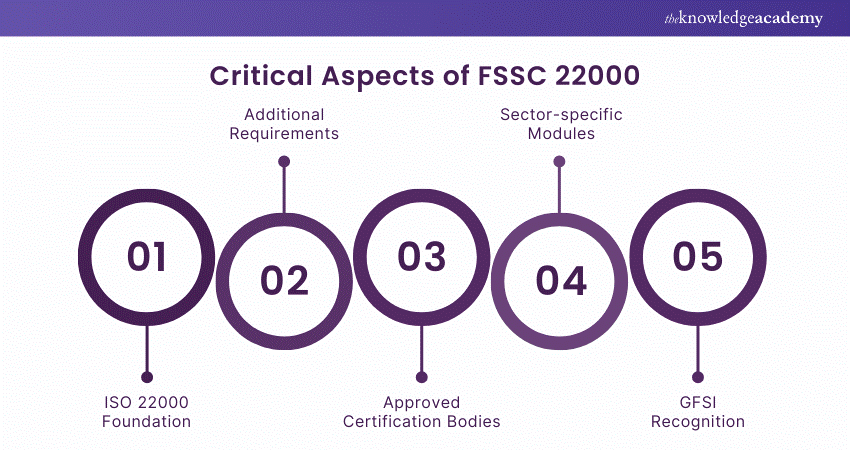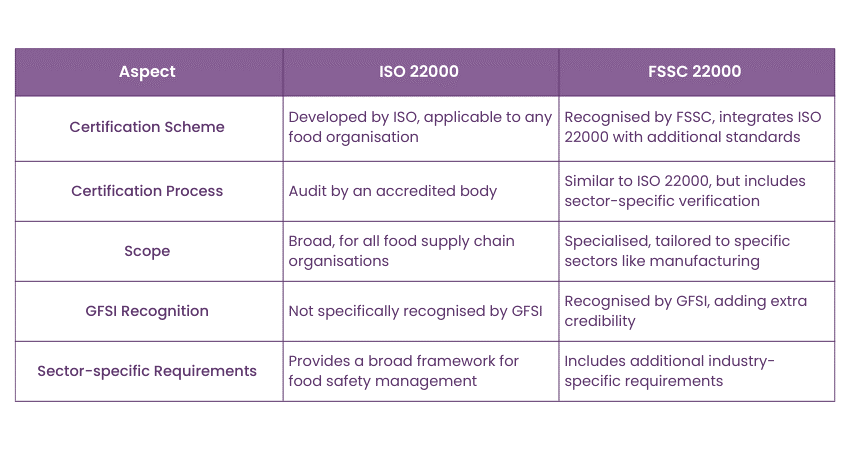We may not have the course you’re looking for. If you enquire or give us a call on 800600725 and speak to our training experts, we may still be able to help with your training requirements.
Training Outcomes Within Your Budget!
We ensure quality, budget-alignment, and timely delivery by our expert instructors.

Are you torn between ISO 22000 and FSSC 22000 for your organisation? Both standards play a pivotal role in the food industry, but choosing the one that best fits your operational needs can make a world of difference.
Imagine the peace of mind that comes with knowing your organisation not only meets regulatory requirements but also optimises its processes with the most appropriate standard. The right certification can elevate your brand’s reputation and trustworthiness.
Continue reading this blog as we explore the Difference Between ISO 22000 and FSSC 22000, guiding you to make an informed decision that aligns perfectly with your organisation’s goals and compliance needs.
Table of Contents
1) What is ISO 22000?
2) What is FSSC 22000?
3) Differences Between ISO 22000 and FSSC 22000
a) Certification Scheme
b) Certification Process
c) Scope
d) GFSI Recognition
e) Sector-specific Requirements
4) Conclusion
What is ISO 22000?
ISO 22000 is an international standard for Food Safety Management systems, ensuring food safety throughout the supply chain. It integrates principles of HACCP and communication. This standard applies to organisations of all sizes involved in the food industry. ISO 22000 focuses on hazard control, risk management, and continuous improvement.
By implementing ISO 22000, companies demonstrate their commitment to delivering safe, high-quality food products. It also enhances transparency and trust with stakeholders, ensuring regulatory compliance. Organisations worldwide adopt ISO 22000 to maintain safety, improve efficiency, and protect consumers from foodborne hazards.
Critical Aspects of ISO 22000
ISO 22000 helps organisations ensure safe food production and handling. Below are the key components that define the structure and effectiveness of ISO 22000 in safeguarding food safety
1) Hazard Analysis: ISO 22000 mandates a comprehensive hazard analysis to identify potential food safety risks and implement control measures to mitigate them.
2) Prerequisite Programs: The standard emphasises the establishment of prerequisite programs, essential conditions, and activities required to maintain a hygienic environment for food production.
3) HACCP Principles: ISO 22000 integrates the Hazard Analysis and Critical Control Points (HACCP) principles, a systematic approach to identifying, assessing, and mitigating food production risks.
4) Management System: ISO 22000 follows the Plan-Do-Check-Act (PDCA) cycle, enabling organisations to continuously improve their Food Safety Management system.
5) Communication: Effective communication across the food chain is vital in ISO 22000, ensuring all stakeholders understand their roles and responsibilities in food safety.
What is FSSC 22000?
FSSC or Food Safety System Certification 22000 is an internationally recognized certification scheme for Food Safety Management Systems, built on the foundation of ISO 22000 with additional sector-specific requirements. It is tailored for food manufacturers, processors, and packaging companies to ensure product safety and regulatory compliance. FSSC 22000 combines ISO 22000 with industry-specific prerequisites and additional standards like ISO/TS 22002-1.
This certification enables organisations to demonstrate their commitment to food safety, quality, and adherence to regulatory standards. FSSC 22000 is widely trusted by retailers, manufacturers, and food service providers, making it a preferred choice for global food safety certification.
Critical Aspects of FSSC 22000
FSSC 22000 is a robust food safety certification scheme designed to meet the complex needs of the global food industry. Here are the key elements that make FSSC 22000 a comprehensive standard for Food Safety Management:

1) ISO 22000 Foundation: FSSC 22000 is rooted in ISO 22000, encompassing all its requirements while adding specific criteria tailored to the food industry.
2) Additional Requirements: FSSC 22000 includes extra provisions for prerequisite programs, food defence, fraud prevention, and allergen management, among other critical areas.
3) Approved Certification Bodies: Certification under FSSC 22000 is issued by accredited bodies authorised by the Foundation for Food Safety Certification.
4) Sector-specific Modules: FSSC 22000 provides sector-specific modules catering to various food industry segments, including manufacturing, packaging, and animal feed production.
5) GFSI Recognition: FSSC 22000 is recognised by the Global Food Safety Initiative (GFSI), meeting international benchmarks for Food Safety Management systems.
Join our ISO 22000 Lead Auditor Training and learn how to manage the FSMS Audit Team during an ongoing audit effectively – Sign up today!
Differences Between ISO 22000 and FSSC 22000
While both ISO 22000 and FSSC 22000 focus on Food Safety Management systems, they differ in key aspects. Here are the main differentiating factors:

1) Certification Scheme
ISO 22000 is a standard developed by the International Organization for Standardization (ISO) and is applicable to any organization within the food industry. In contrast, FSSC 22000 is a certification scheme recognized by the Foundation for Food Safety System Certification (FSSC), which integrates the ISO 22000 requirements with additional sector-specific standards.
2) Certification Process
ISO 22000 certification is obtained through an audit by an accredited certification body that assesses the organisation’s compliance with the standard. FSSC 22000 Certification follows a similar process but includes an additional step to verify compliance with sector-specific requirements.
3) Scope
ISO 22000 is applicable to all organisations within the food supply chain, regardless of size or sector, providing a broad framework for managing food safety hazards. FSSC 22000, in contrast, is more specialised and tailored to specific sectors like food manufacturing, processing, and packaging, with additional requirements specific to these areas.
4) Global Food Safety Initiative (GFSI) Recognition
FSSC 22000 is recognised by the Global Food Safety Initiative (GFSI), adding extra credibility to organisations that achieve this certification. ISO 22000, though not specifically recognised by GFSI, still provides a strong foundation for implementing a Food Safety Management system.
5) Sector-specific Requirements
FSSC 22000 includes additional requirements tailored to specific industry sectors, such as process controls, allergen management, and food defence. These sector-specific requirements enhance the standard’s effectiveness in addressing industry-specific food safety risks.
Learn about global food safety standards with our various ISO 22000 Certification – Register today!
Conclusion
The Difference Between ISO 22000 and FSSC 22000 lies in their scope and specificity. ISO 22000 offers a broad framework for food safety, while FSSC 22000 adds sector-specific requirements and GFSI recognition. Choosing the right standard depends on your organisation’s specific needs and industry focus. Understanding these differences ensures you select the most effective Food Safety Management system.
Become familiar with various approaches, methods, and practices of ISO 22000 with our ISO 22000 Foundation Training – Join now!
Frequently Asked Questions

FSSC 22000 is needed to address specific industry requirements that go beyond ISO 22000, ensuring comprehensive Food Safety Management. It integrates additional sector-specific standards and is recognised by the Global Food Safety Initiative (GFSI), enhancing credibility and trust across the global food supply chain.

FSSC 22000 comprises several clauses, primarily based on the structure of ISO 22000, which includes 10 main clauses. These clauses cover the scope, normative references, terms, context, leadership, planning, support, operation, performance evaluation, and improvement, with additional sector-specific requirements incorporated.

The Knowledge Academy takes global learning to new heights, offering over 30,000 online courses across 490+ locations in 220 countries. This expansive reach ensures accessibility and convenience for learners worldwide.
Alongside our diverse Online Course Catalogue, encompassing 19 major categories, we go the extra mile by providing a plethora of free educational Online Resources like News updates, Blogs, videos, webinars, and interview questions. Tailoring learning experiences further, professionals can maximise value with customisable Course Bundles of TKA.

The Knowledge Academy’s Knowledge Pass, a prepaid voucher, adds another layer of flexibility, allowing course bookings over a 12-month period. Join us on a journey where education knows no bounds.

The Knowledge Academy offers various ISO 22000 Training, including ISO 22000 Foundation Training, ISO 22000 Lead Auditor Training and ISO 22000 Internal Auditor Training. These courses cater to different skill levels, providing comprehensive insights into What Is ISO 22000.
Our Health & Safety Blogs cover a range of topics related to ISO 22000, offering valuable resources, best practices, and industry insights. Whether you are a beginner or looking to advance your skills in Health & Safety, The Knowledge Academy's diverse courses and informative blogs have you covered.
Upcoming Health & Safety Resources Batches & Dates
Date
 ISO 22000 Foundation Training
ISO 22000 Foundation Training
Mon 17th Feb 2025
Mon 2nd Jun 2025
Mon 22nd Sep 2025
Mon 15th Dec 2025







 Top Rated Course
Top Rated Course



 If you wish to make any changes to your course, please
If you wish to make any changes to your course, please


